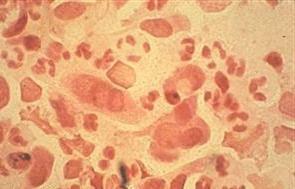 Intestinal flu was not isolated yet 20-30 years ago as a separate disease. It was a simple intestinal infection, one of many.However, in the 70-ies of the twentieth century, rotavirus, the causative agent of intestinal flu, was discovered, after which the disease got its name.
Intestinal flu was not isolated yet 20-30 years ago as a separate disease. It was a simple intestinal infection, one of many.However, in the 70-ies of the twentieth century, rotavirus, the causative agent of intestinal flu, was discovered, after which the disease got its name.
What is it? Intestinal flu is a simplified name for gastroenteritis or rotavirus infection, the causative agent of which is rotavirus. Its reproduction leads to inflammation of the gastrointestinal tract. In this article, we'll talk about when the diagnosis of "intestinal flu", the symptoms and treatment of this unpleasant illness, and what the disease is dangerous for adults and children, is diagnosed.
Why do children get sick more often than adults?
The fact that intestinal flu in children manifests much more often than in adults is a consequence of the peculiarity of the child's organism, which is the low level of acidity of the gastric juice. The body of adults is somewhat protected against rotaviruses due to higher acidity, as well as a sufficient amount of IgA immunoglobulin production.
- A certain role is played by the habit of children taking toys and other items into their mouths.
Antiviral drugs are powerless before rotavirus. Intestinal flu in children can be very dangerous. The appearance of diarrhea and frequent vomiting should be an occasion for immediate treatment to the pediatrician. Prevention is an important aspect of protecting infants from infection.
How can I get infected?
Why does intestinal flu occur, and what is it? The causative agent of the disease is rotavirus. The causative agent of the disease was first discovered in 1973 in a small intestine biopsy in children with gastroenteritis. The main source of infection is a sick person or a virus carrier. Microbes, getting into the human body, multiply in the cells of the mucous membrane of the digestive tract and are released into the environment along with feces. Isolation of the virus occurs immediately after infection.
The main path of infection - when eating food that is infected with the virus, is not well processed during cooking and when elementary rules of personal hygiene are ignored. This is also a "disease of dirty hands", like most intestinal diseases. A good environment for the development of rotavirus infection is water, dairy products.
Most often, children with an intestinal flu from six months to 3 years old. Older children do not get sick often, they have relatively stable immunity.
Symptoms of intestinal flu
In the case of intestinal influenza in adults, the symptoms can be divided into two groups. The first group includes those signs that are typical of a common cold or flu. The second group contains symptoms associated with disorders of the stomach and intestines.
The main signs of intestinal flu in adults are:
- nausea, vomiting without blood and mucus;
- weakness, body aches, pain in the muscles;
- cough (usually dry);
- nasal congestion and runny nose;
- redness, swelling and sore throat;
- low-grade or high fever;
- conjunctivitis;
- Gastrointestinal disorders, abdominal cramps, flatulence, with a frequent light
- foaming stool with an unpleasant odor;
- with severe development of the disease there are signs of dehydration.
The incubation periodwith intestinal flu is from several hours to five days. It is during this time that the infectious organism enters the gastrointestinal tract and begins to actively multiply there. How quickly the infection takes possession of the body depends on the amount of the virus-pathogen in it. The severity of the course of gastroenteritis also depends on this factor. The disease is most difficult for children and elderly people.
The duration of the disease in adults is an average of one week, but complete recovery does not occur until 5-7 days after the acute stage of the disease. Nevertheless, a person can still be a carrier of the disease, so it is worth sticking to strict rules of personal hygiene, especially in public places.
Complications
Sometimes, with intestinal flu, due to a large loss of fluid, dehydration of the body may occur, which requires special attention and careful selection of medicines. Dehydration can be evidenced by sunken eyes, dizziness, thirst, stickiness in the mouth, dry skin.
Dehydration of the body can be weakened, offering the patient a warm drink and some dietary food containing bananas, rice, apple juice, crackers. This is an anti-inflammatory diet.
How to treat intestinal flu?
Antibiotics are not used because of inefficiency. In the case of intestinal flu, treatment is aimed at eliminating symptoms and has specific goals:
- elimination of dehydration;
- the raising of the body's immune forces;
- restoration of water-electrolyte balance;
- normalization of bowel function;
- replenishment of a lack of enzymes.
To achieve the goals set, the following groups of medicines are used:
- enterosorbents;
- astringent herbal preparations;
- enzymatic drugs;
- drugs that normalize the microflora (pro-, pre and eubiotics);
- antipyretic;
- vitamin complexes.
Treatment Scheme
Specific treatment of intestinal flu in adults does not exist yet. Home therapyis aimed at reducing intoxication, normalization of water-salt metabolism, which is disturbed by diarrhea and vomiting. That is, the treatment is mostly symptomatic, aimed at reducing the negative impact of the virus on the body.
General principles of treatment of rotavirus infection:
- First of all, it is necessaryrehydration therapy, for which 1 bag of Regidron is dissolved in a liter of boiled water and drunk during the day every half hour. Adults, regardless of the severity of the condition after vomiting or stool, drink 200 ml. solution, since fluid loss should be replenished in the first 6 hours. Children with frequent vomiting and diarrhea are shown hospitalization.
- Purpose of sorbents(Activated charcoal, Enterosgel, Smecta) and medications that relieve bloating and improve the intestinal microflora.
- You should also take medication withdigestive enzymes- Creon, Pancreatin, Mezim forte.
- Compliance with diet. When intestinal flu is recommended a gentle diet, excluding fried, fatty, dairy products, carbonated drinks and juices. It is advisable to eat porridges cooked on the water, vegetable soups, compotes from dried fruits, jelly.
- With severe vomiting, it is possible to useantiemetic drugs.
- With severe diarrhea with fever, doctors usually prescribe Furazolidone or Enterofuril.
- Showing a half-bed regime and isolation of the patient from healthy people.
- After the acute phase of the flu, it is necessary to restore the intestinal microflora. To do this, use probiotics - Lineks, Bifiform, Hilak Fort, etc.
- If the symptoms are pronounced, hospitalization in the hospital is indicated.
Since there is no etiotropic treatment of this disease, prevention of intestinal flu is of great importance. Preventive measures include the whole complex used for intestinal infections: regular hand washing, cleaning of premises with disinfectant and antiseptic solutions, treatment of utensils and products, the greatest possible isolation of patients from healthy ones. With these rules, the spread of the disease can be stopped.
Food
Diet for intestinal flu is mandatory: the patient throughout the course of treatment should not eat spicy and fried foods, should eat more vegetable soups, drink jelly and compote.
With diarrhea and vomiting the body is dehydrated, so you need to consume more fluid. To ensure that the intestines are not going to gases, you need to eat sour-milk products, toast and biscuit.

How to choose probiotics for the intestine: a list of drugs.

Effective and inexpensive cough syrups for children and adults.

Modern non-steroidal anti-inflammatory drugs.

Review of tablets from the increased pressure of the new generation.
 Antiviral drugs are inexpensive and effective.
Antiviral drugs are inexpensive and effective.



